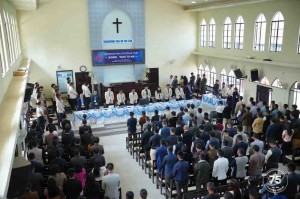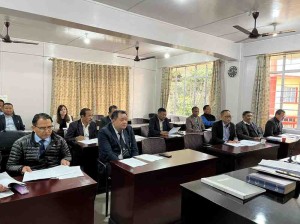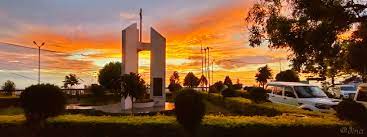BCM Relief & Development department is of the youngest departments of BCM. Before the department was formed in 1990, BCM was recipient of gifts from other Christian organizations for emergency relief of victims of natural calamities like famine, cyclone and monsoon ravages. There was a Relief Committee responsible for the fair distribution of the relief fund and materials to the sufferers. It was an awareness of the need to give more permanent aid to the poor and needy and to help develop the community that prompted BCM to constitute the Relief and Development Department with the objective of teaching and empowering community to help and develop themselves based on Biblical teaching in various ways.
ACTIVITIES: With the help of God and partner agencies the following projects have been undertaken. Some have been accomplished and some are under implementation.
I. Skill Training: To provide job oriented skills in different trades. Skill training has been organized in various trades for those who have little or no formal education.
Listed below are number of people graduated in different trades since 1991 :
| 1. |
Tailoring |
- |
80 |
| 2. |
Carpentry, Cement & Masonry |
- |
32 |
| 3. |
Electronics Mechanics |
- |
20 |
| 4. |
Hair Dressing |
- |
5 |
| 5. |
Weaving |
- |
30 |
| 6. |
Typing |
- |
345 |
| 7. |
Computer Operation |
- |
10 |
| 8. |
Food & Fruits Preservations, etc. |
- |
34 |
| 9. |
Shoe Repairing |
- |
5 |
| 10. |
Printing Press Apprenticeship |
- |
10 |
To undergo the above courses, candidates came from different parts of Mizoram and sometimes from Myanmar and Bangladesh also. We are very happy that many of those we have trained are now employed in various government and private organizations. Some of them have opened their own shops and training centers giving training to other people while some of them are undergoing training for higher skills in other higher skill training centres in the cities.
II. Health: Health is an important input for the development of any community. This is very true of Mizoram. Malaria is a dreaded disease since it is the cause of early death, lifelong ill health, resulting in chronic poverty and indebtedness. Mizoram seems to be the worst affected by malaria in the world as reported by WHO members who visited the area. To improve the community health, the following programmes have been implemented.
1. Malaria Clinic Centres were opened in three identified Malaria infested regions, near Bangladesh border for a population of abut 7000 people. Within one year, trained microscopists examined 2514 suspected cases, out of which 564 were detected positive. Suspected and detected victims were given proper treatment. About 90% of malarial cases were detected in these areas, and as many as 78% families were found affected by malaria. These centers are now self-supporting with a minimum capital fund provided for microscope, training of skilled persons and medical aid. It is run by the local churches. Leadership, provided by members of the community has proved to be effective. These leaders are more influential and as they are usually based in the community, their commitment to be projects has been found to be of a sustained nature. Mosquito nets were distributed to poor families living in malaria prone areas. Since 1991, R&D distributes 300-500mosquito nets annually. The State Government has also started providing mosquito nets to poor people since two years back and we hope with the concerted efforts, death by malaria will continue to be reduced. Instead to waiting for the sick to show up in the centers our workers go into the communities who need service.
We also have a hope of bringing positive change in the rural health service of the Government by our example.
2. Health care training are conducted in our Training Centre and in rural areas with experts in the fields of personal hygiene for men and women, community health, first aid, communicable diseases and pre and post natal care. 613 people were trained during 24 training sessions and the programme is still going on, since more than 60% of our population are in an inaccessible areas for medical personnel and facilities. It is hoped that this project will facilitate community medical care until dispensaries and hospitals are provided.
3. Mizos from time immemorial have been smoking homegrown tobacco. An Anti-smoking campaign was launched and many people gave up smoking. In this way social and cultural bad practice of smoking is greatly reduced to improve health and etiquette.
4. Medical clinics were also conducted with experts in times of epidemic due to different disasters. In this way, we work towards health improvement directly for more than twenty five thousand people since the BCM starts its relief and development ministry.
III. Permanent farming/Alternative to Jhum: Like many other developing countries, 70% of Mizo populations are fully or partially dependent on Agriculture. But the production is far from being self-sufficient due to lack of reliable method of farming, lack of infrastructure and declining fertility of the soil. 95% of Mizoram farmers are still practising a century old method of shifting cultivation, contributing to severe soil depletion and environmental problems. It was found that 75000 rural families cleared 45 acres of forests each annually for food crops cultivation. Based on the Indian Council of Agricultural Research's (ICAR) calculation (i.e. 41 tons/hc), total topsoil loss because of shifting cultivation in Mizoram can be estimated to be around 1383750 tons annually. A new farming method on the hill slopes called Sloping Agriculture Land Technology (SALT) was learnt from ARLDF and BCM R&D at 1hc.of land donated by Pu Hauchhuma, demonstrates the system. It was found that the system is applicable for steep hilly lands like Mizoram. The system is taught to farmers by way of learning by do it yourself method.
Till September 2002, 145 farmers and 20 trainers were trained in SALT method of farming. It was found that more than fifty farming families are practising this method. With the initiative of the BCM Relief and Development Department, experts from ARLD of Philippines were invited to Mizoram in 1997 and training on SALT farming was organized and hosted by the state government in which the then Chief Minister Mr. Lalthanhawla was also presented. It obviously attracted farmers and government officials to maintain the sustainability of agriculture system. By adopting this method we are planning to bring a reliable farming system for Mizoram. The state government and the R&D of BCM prepared a teaching material in local language and is widely used by people at different levels. At present there are no better farming system to apply than SALT as it sustains itself asking minimum labour and financial investment while it is very easy to learn. Indigenous and imported nitrogen fixing tree seeds are collected and distributed to farmers to help them make green terraces to add the fertility of their farms. We also support more than ten farmers to acquire land for permanent farming through the Village Council. By adopting SALT we hope to be successful introducer of sustainable farming system for Mizoram in the near future.
IV. Revolving fund Scheme: This is a system of providing minimum capital fund as interest free loan to trained people to enable them to practise their acquired skills. It was designed to repay on installment basis from the sales of their products. Through this scheme 123 families were supported in various trades. Though it is without any interest, 100% recovery is almost impossible. The latest record shows that 72% of fund loaned to these people were recovered. Though we do not make 100% recovery we found that 90% of the beneficiaries are making use of the fund to improve their family economy and for self-employment. We are planning to expand this scheme by providing interest free loan for training in job oriented courses like - BSW, BBM, MBBS, BE, Vocational trainings, Courses in Computer and Rural Development, Trainings in Knitting, Tailoring Carpentry, Farming Technology, Auto-Mechanics and other self-employment skills.
V. Formation of Sharing Group: To build a spirit of cooperation to overcome common problems and to help one another towards sustainability, it is felt that building a team or group of people is necessary. Also, because of the fact that a handful of R&D workers cannot work for and with the people in each of their area of need. Therefore to help each other through collective responsibilities 8 people's groups for men and women to do income-generating programme was formed. The group is named 'The sharing Group'.
VI. Local Church Relief and Development Committee: The BCM Assembly in 2001 amended the constitution, giving a provision to have local Relief & Development committees. This program is designed to let the community help themselves in fighting different social evils at local levels and also to build a spirit of cooperation among different groups to bring positive changes as the Bible teaches. It is also expected that any community development projects supported through the Head Office will be operated through local Relief & Development Committees. In this way the local leadership is expected to find people in their faith and their traditional cultures and values. So that they may have more promising future and hope, while not ignoring the potential benefits of socio-economic growth.
VII. Research, Public Education and Community Welfare for development:
1. For the entry point of our work, a simple research called Bench Mark Survey has been conducted in various fields. We were indeed very thankful to the Pu Rochhuma, DRO, Lunglei District for his active cooperation in this work. With the information from them and from our findings we identify the areas of need for our intervention.
2. To bring the knowledge and skill of development and to motivate the community, 1000 copies of development journal was published and is found to be very helpful and will be continued as time goes on.
3. For building relationship and cooperation, small community assets building is one of the activities of the Relief & Development Department. The following are constructed with the community.
a) 15 villages water supply for about 7000 people.
b) 7 Inter Village Suspensions swinging bridges for a population of about 15000
c) 4 Community Shelters accommodating 1500 people.
VIII. Welfare for Children at Risk. Another important project of BCM Relief & Development Department is our concern and action for poor children in cities and towns of Mizoram. There are people who migrated to cities having no houses and depending on daily wages. For these people, providing proper education to their children is almost impossible. Their children are wandering in city streets and selling smuggled goods, and working to earn money etc. they have no time for schools. The BCM feels that these neglected children can be a problem for the future Mizoram. Keeping this in mind, welfare for poor children programme is being implemented in Aizawl City and Thenzawl in the north and Lawngtlai in the south. 300 such children are identified at Aizawl City and schooling materials were provided to these children with the help of the Central Government. At Thenzawl area 200 poor children were selected and supported for four years with the help of World Vision (WVI) and 100 children at Lawngtlai town are identified and supported with Church contribution. In this way, many children are brought to schools leading them to become responsible citizens of the society.
IX. Relief: As the Department starts with the name Relief, responding to human sufferings and distresses caused by natural and man-made calamities is a major activity of the BCM Relief and Development Department. Among the different disasters, landslides, cyclonic storms and fire are the most common disasters affecting Mizoram. As an emergency relief aid to these victims BCM Relief & Development Department provides Rs 1000/- to a family who lost their house and Rs 2000/- is given for lost of live. However, when the whole community in affected by the disasters, relief appeal was made to our partners and local churches. In this situation relief aid were provided to the victims depending upon the availability of funds.
X. Partner Organizations: We have been working in partnership with World Vision, BW Aid, ABWAid, The Sharing Way of CBM, NEICORD, NEIDAC, IGSSS, State and Central Governments of India and we are very much grateful to them for their concern and support.
XI. Drugs and Aids: As Drugs, Alcoholism and AIDS are interrelated development problem and a human problem, it is one of the areas of concern by the Relief & Development Department. In partnership with the Baptist Women Fellowship, Grace Society was established to look after and to support victims of Drugs, Alcohol and Aids. A Rehabilitation center called Chhawmdawlna In was built at an isolated place but not far from the town for this purpose. We are planning to conduct Skill training program exclusively for these people in the Rehabilitation center with Mizoram Baptist Women Fellowship. The Baptist Women group implements this program, though initiated by R&D, and R&D is involving in planning, fund raising and in governing board as a member. We therefore speak out on its causes and we are deeply involved in the prevention, treatment and feedings of the inmates.
XII. Resources: The Baptist Church of Mizoram contributes about one million rupees annually, which is permitted to increase by 5% each new financial year from 2000. This fund is set aside by the BCM Assembly from Church member's contribution and is available from the Head Office. As majority of the local contribution goes for staff salaries, relief aid and other management expenditures like stationeries etc., about 60% of the above mentioned activities are implemented with contributions from partner agencies. Besides supporting our programmes and staff salaries in cash, the local Churches also make a significant contribution by collecting their secondhand clothing and utensils for the poor. These collected materials are packed and distributed by Relief & Development Department to the needy people living in and around Mizoram. During 2002, 4500 pieces of clothing and 350 various utensils are collected and distributed to the needy in different places.
XIII. Office and Staff: BCM Relief & Development department has a separate Office and a campus near the Head Office. Training programmes are conducted in the campus where there is a lecture hall and accommodation for trainees who come for a short period of training. There are three permanent staff and seven programme staff working in the office. XIV. Conclusion: Through the ministry of BCM relief and development, unemployed people find employment and some people who lost hopes have a new hope for their future. The ministry of Relief & Development Department is growing and we thank and praise God for the opportunity and privilege of serving Him by serving the people though in a small way.
XIV. Conclusion: Through the ministry of BCM relief and development, unemployed people find employment and some people who lost hopes have a new hope for their future. The ministry of Relief & Development Department is growing and we thank and praise God for the opportunity and privilege of serving Him by serving the people though in a small way.




